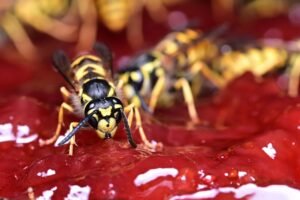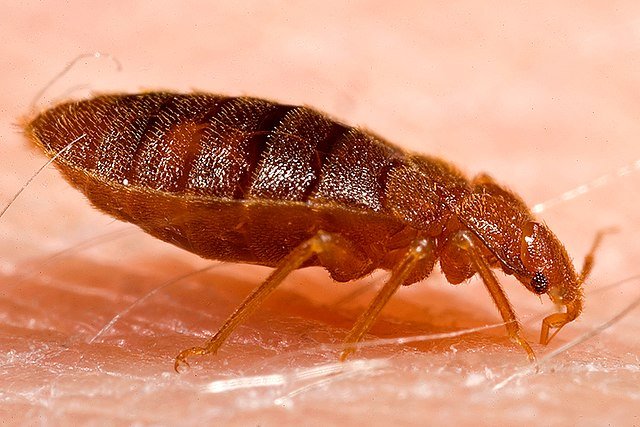Wasp Pest Control: Simple Guide for Homes and Gardens
 Wasp pest control is important during summer when wasps become active. Wasps may sting and build nests near homes, but they also help the environment. This guide explains how to deal with wasps and how they live.
Wasp pest control is important during summer when wasps become active. Wasps may sting and build nests near homes, but they also help the environment. This guide explains how to deal with wasps and how they live.
What Are Wasps?
Wasps are flying insects. One common type is Vespula vulgaris. They have yellow and black bodies. There are over 5,000 species of wasps in the world. Some wasps live alone, others live in colonies.
Wasps are not always aggressive, but they defend their nest if disturbed. Their sting is painful and can cause allergic reactions. Still, they play an important role in nature.
Are Wasps Good or Bad?
Wasps are beneficial insects. They eat other insects like flies and caterpillars. They help control pest populations in nature. This makes them important for the balance of the ecosystem.
Every summer, wasps catch millions of insects to feed their young. Adult wasps eat mostly sugar from nectar, fruits, or honeydew from aphids.
What Do Wasps Eat?
-
Adult wasps eat sugar
-
Baby wasps (larvae) eat insects
-
Workers catch bugs, cut them in small pieces, and bring them to the nest
-
Larvae give back sweet liquid to adults
This exchange keeps the colony alive. Wasps mostly want carbs, not protein.
Do Wasps Help with Pollination?
Yes, but not like bees. When wasps visit flowers to drink nectar, they can carry pollen between plants. This makes them accidental pollinators.
Wasps are also food for other animals. For example, the Vespa crabro hornet eats wasps like Vespula vulgaris.
Where Do Wasps Go in Winter?
Most wasps die in autumn. Only new queen wasps survive by sleeping (hibernating) in safe places like attics, basements, or holes in the ground.
In spring, surviving queens build a new small nest and lay eggs. When new workers grow, they help the colony expand. By summer, the nest becomes large and active.
Where Do Wasps Build Nests?
Wasps like quiet, sheltered places:
-
Inside walls
-
In sheds or attics
-
On balconies
-
Under roof tiles
-
In tree hollows or underground
In warm countries, wasp nests can become very large. Some nests may have millions of wasps.
Why Do Wasps Sting?
Wasps sting to:
-
Defend their nest
-
Catch prey
-
Protect themselves from danger
Unlike bees, wasps do not die after stinging. They can sting many times. Their stinger is smooth, not barbed like a bee’s.
If their venom runs out, they just make more.
Common Wasps Around the World
Europe and Mediterranean
-
Vespula vulgaris – Common wasp. Yellow and black stripes. Very active in summer.
-
Vespula germanica – German wasp. Similar to vulgaris, often found near homes.
-
Vespa crabro – European hornet. Larger, louder, stronger sting. Lives in forests but also near towns.
North America
-
Polistes dominula – European paper wasp, now common in USA and Canada. Often confused with yellowjackets.
-
Vespula maculifrons – Eastern yellowjacket. Common across eastern and central USA.
-
Dolichovespula maculata – Bald-faced hornet. Black and white, builds large aerial nests.
Australia
-
Polistes humilis – Australian paper wasp. Builds small umbrella nests under eaves and leaves.
-
Vespula germanica – Invasive species. Aggressive and widespread in urban areas.
Asia
-
Vespa mandarinia – Asian giant hornet. Found in East Asia. Very large and aggressive.
-
Polistes chinensis – Common paper wasp in Japan, Korea, China.
How to Prevent Wasp Problems
1. Stop Nest Building Early
-
Seal cracks and small holes around the house
-
Use mesh on vents and windows
-
Check attics and sheds in early spring
2. Keep Food and Sugar Covered
-
Don’t leave soda, juice, or fruits outside
-
Use sealed bins for food waste
-
Clean spills and outdoor tables quickly
3. Use Wasp Decoys or Traps
-
Hang fake nests to discourage wasps
-
Use sugar-based traps to catch wasps
-
Place traps away from children and pets
What to Do If You See a Wasp Nest
-
Stay calm
-
Don’t hit or wave at wasps
-
Avoid getting too close to the nest
-
Close windows and keep kids away
-
Do not try to destroy the nest yourself
Wasp colonies can become aggressive if threatened.
Do Wasps Return Every Year?
No, the old nest is not reused. But if the area is good (quiet, dry), a new queen may build a new nest in the same spot. That’s why prevention in spring is key.
Conclusion
Wasps can be scary, but they are also useful in nature. With simple actions, you can avoid wasp problems around your home. Understanding how wasps live helps you control them better.
If needed, traps and deterrents can help reduce wasp activity.
Disclaimer
This article is for informational purposes only. Pest control laws and approved chemicals vary by country. For best results and legal safety, we strongly recommend contacting a licensed pest control professional in your local area. Always make sure that the pest control technician is properly certified or licensed, depending on your country’s regulations. It’s important to confirm that they only use approved products and apply them exactly as instructed on the product label. In most places in Europe, UK, or USA, following label directions is not just best practice—it’s the law.

